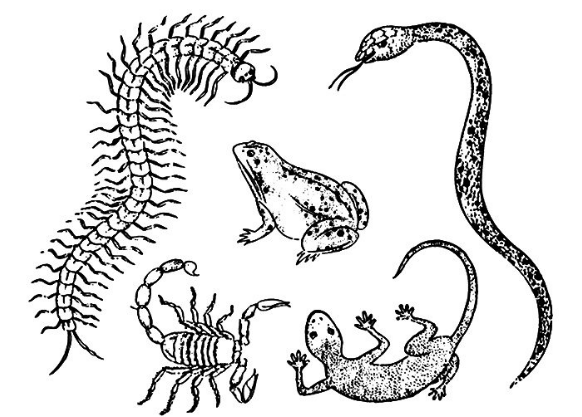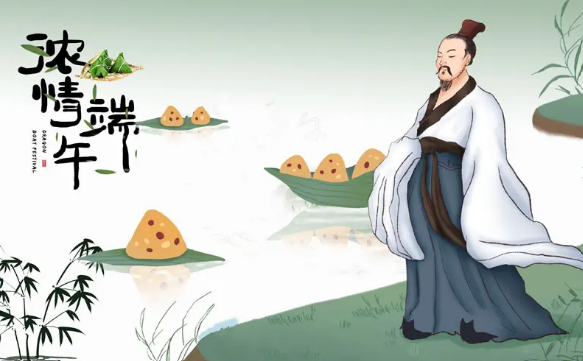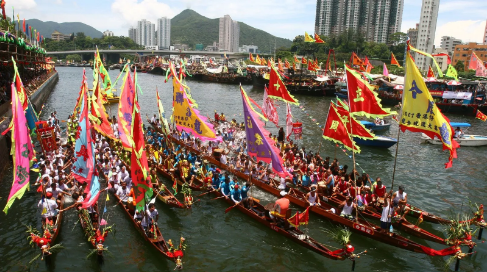Awakening the Dragon: Unveiling the History and Timeless Traditions of the Dragon Boat Festival
(https://studycli.org/chinese-holidays/dragon-boat-festival/)
The Dragon Boat Festival– celebrated on the fifth day of the fifth month of the lunar calendar, is one of many traditional Chinese holidays celebrated up to this day. The festival is also called the “Double Fifth Festival”. The tradition of celebrating the Dragon Boat Festival has been a habit for more than two thousand years. The original meaning of this custom was to ward off evil spirits. In ancient times, the fifth month was considered an unlucky month by people in some areas of China because they believed the dreaded five poisonous animals started coming out of their winter hiding places. These animals included centipedes, poisonous snakes, scorpions, lizards, and toads. However, since the Six Dynasties, there has been a folktale about Qu Yuan’s death, and it has become the most popular story to explain the origin of the Dragon Boat Festival.
(https://studycli.org/chinese-holidays/dragon-boat-festival/)
(https://www.chinahighlights.com/festivals/dragon-boat-festival-history.htm)
Who is Qu Yuan? Qu Yuan (340-278 BC) is a famous Warring States statesman and, poet, author of Sorrow at Parting in Songs of Chu. He served faithfully as a government official. However, his proposition was repaid with treachery. The King of Chu listened to this information, but not only did he not accept Qu Yuan’s proposition, but he also drove him out of the capital of Chu State. After he left the state, he heard the information that Chu State was defeated by Qin State. Feeling that he had no power to save his country, he committed suicide by jumping into the Mi Luo River. This happened in 278 BC on the fifth day of the fifth month of the lunar calendar. After hearing this news, people rowed to retrieve his body, but they never succeeded. To prevent fish and shrimp from eating Qu Yuan’s body, people throw food to feed the fish and shrimp.
After that day, people would do the same thing every year on the fifth day of the fifth month of the lunar year. Later, people used reed leaves to wrap glutinous rice into dumplings and throw it into the river. For thousands of years, Qu Yuan’s patriotic spirit and heartfelt poems have been deeply rooted in people’s hearts, so people cherish, mourn, and talk and pass down his words from generation to generation. This is also why the folktale of Qu Yuan has the deepest and widest influence in Dragon Boat Festival history. As a result, the custom of eating pyramid-shaped dumplings made of glutinous rice wrapped in bamboo or reed leaves and racing dragon boats was formed.
The Dragon Boat Festival has been celebrated for many years, even in this sophisticated world. It is celebrated in many countries besides China, for instance, Canada, Singapore, Japan, Vietnam, South Korea, and The United States. How do people usually celebrate the Dragon Boat Festival? Here are some activities people do during the Dragon Boat Festival.
- Dragon Boat Racing
(https://www.bbc.com/travel/article/20120621-hong-kongs-dragon-boat-festivities)
This activity counterfeits the action of searching for Qu Yuan’s body in Mi Luo River. On the other hand, some scholars believe that this activity most likely has begun as a way to worship the Dragon God since dragon boat racing itself has had a history of over 2,000 years. In rural China, dragon boat racing has been deeply rooted as a sport, and winning championships in dragon boat racing is valued by people. There is even a saying among the people that “it is better to waste a year’s field than lose a year’s boat”.
2. Eating Zongzi
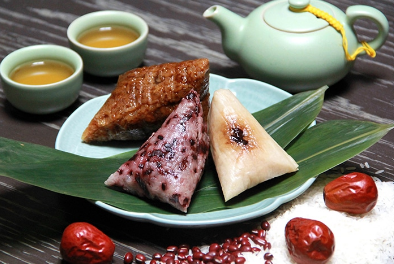
(https://studycli.org/chinese-holidays/dragon-boat-festival/)
Zongzi are pyramid-shaped dumplings made of glutinous rice wrapped in bamboo or reed leaves and filled with various sweet and savory fillings. In North China, people add jujube filling, and in South China, people add sweet red bean paste filling. These are the most common fillings for zongzi. Meanwhile, the savory zongzi could be stuffed with pork, mushrooms, and salted egg yolks. Zongzi is seen as a resemblance to the glutinous rice dumplings thrown into the river to prevent fish and shrimp from eating Qu Yuan’s body.
3. Hanging Calamus and Mugwort
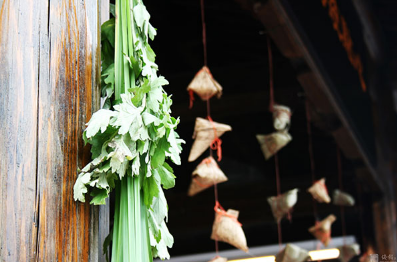 (https://www.discoverchinatours.com/china-tour-guide/china-tour-guide-71.html)
(https://www.discoverchinatours.com/china-tour-guide/china-tour-guide-71.html)
This practice is done to repel flies, insects, fleas, and moths. Chinese usually hang them on the doors or windows. The activity is related to the story that five poisonous animals appear during the fifth month. Besides, these herbs could give off an aroma that they believe could prevent them from insect bites and diseases.
4. Wearing Perfume Pouches
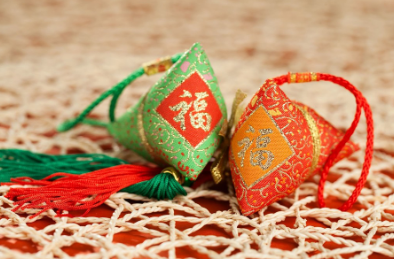 (https://www.chinadaily.com.cn/a/202006/25/WS5ef40bf6a310834817255455_6.html)
(https://www.chinadaily.com.cn/a/202006/25/WS5ef40bf6a310834817255455_6.html)
Perfume pouches are usually small cloth bags filled with vanilla, herbs, realgar, and flower petals. People may carry them or use them as decorations. During the approaching Dragon Boat Festival, when germs easily spread, perfume pouches with pleasant fragrances and special medicinal properties are utilized to eliminate germs and prevent diseases.
5. Displaying the Portrait of Zhong Kui
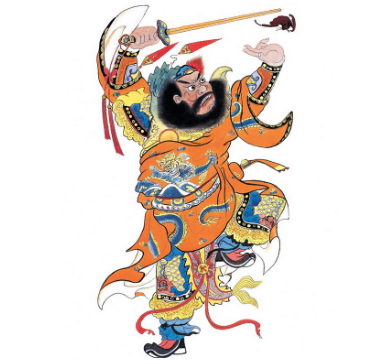
(https://www.chinadaily.com.cn/culture/2014-05/30/content_17551129_7.htm)
People hang Zhong Kui’s portrait to ward off evil spirits and to invoke the safety of their entire family. Zhong Kui, known for his ability to capture ghosts, lived during the Tang Dynasty (618 – 907 AD). By appearing in the emperor’s dream and expelling ghosts from the imperial palace, he gained respect and popularity, which led to his widespread recognition through the emperor’s decree.
References:
https://studycli.org/chinese-holidays/dragon-boat-festival/
https://www.gov.cn/test/2006-06/06/content_301527.htm
https://www.travelchinaguide.com/essential/holidays/dragon-boat.htm
https://www.chinadaily.com.cn/culture/2016-06/07/content_25640452_4.htm



